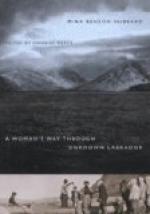From the George River post they hunt west for the caribou, which are more often found in the vicinity of Whale River post than at either George River or Fort Chimo to the west. For the five years preceding my visit the caribou had crossed regularly in November at Whale River. That is to say they were seen there in great numbers, but no one knew whence they had come, or whither they went. Their coming cannot, however, be counted upon every year.
In September 1889 the whole band of George River Eskimo went for the annual hunt, by which they expect to supply themselves with winter clothing. Day after day they travelled on without finding the deer. When provisions gave out they were so far away from the post that they dared not turn back. One family after another dropped behind. Finally, the last little company gave up, one young man only having the strength to go any farther. He, too, was about to sink down, when at last be came upon the caribou. He went back to help the others, but in spite of their best efforts twenty-one of the band perished from starvation.
That the caribou of Labrador have greatly decreased in numbers seems certain. Mr. Peter M’Kenzie, Chief Factor of the Hudson’s Bay Company in the east, who was a fellow-traveller on my return journey, told me that many years ago while in charge of Fort Chimo he had seen the caribou passing steadily for three days just as I saw them on this 8th of August, not in thousands, but hundreds of thousands. The depletion of the great herds of former days is attributed to the unreasoning slaughter of the animals at the time of migration by Indians in the interior and Eskimo of the coast, not only at Ungava, but on the east coast as well, for the caribou sometimes find their way to the Atlantic. The fires also which have swept the country, destroying the moss on which they feed, have had their share in the work of destruction.
Only twice during the journey did we find trace of their enemy—the wolves. These hunt the caribou in packs, cutting out a single deer, and following him till his strength is gone, when they jump on him and pull him down. Mr. M’Kenzie tells how, when on one of his hunting trips at Fort Chimo, a caribou came over the ridge but a short distance from him followed by seven wolves. The animal had almost reached the limit of his strength. He ran with head low and tongue hanging out. From cover of a boulder Mr. M’Kenzie waited for them to pass, and one after another he dropped four of the wolves. The others taking the hint altered their course, and the victim escaped.
CHAPTER XIII
ACROSS THE DIVIDE
The gale continued all night with passing showers, which threatened to riddle the tent with their force, and it was not till ten the following forenoon that we were able to proceed, hugging the shore as we went. Deer were about in all directions, and as we rounded a point near the head of the lake, George, standing in the bow of the canoe, and looking across to the woods beyond the big marsh, which stretched away northward, said: “The wood over there is just moving with them.”




